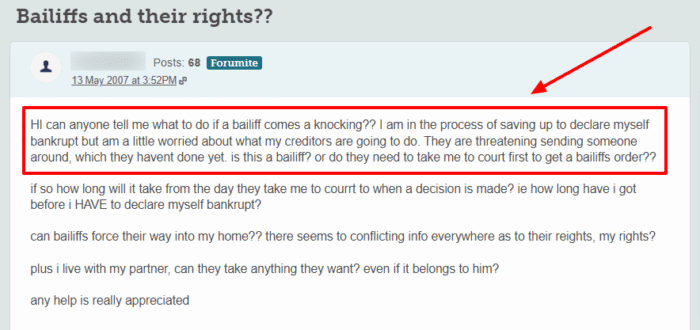Why Are Bailiffs Rude? Psychological Tactics to Fight Back!
For free & impartial money advice you can visit MoneyHelper. We work with The Debt Advice Service who provide information about your options. This isn’t a full fact-find, some debt solutions may not be suitable in all circumstances, ongoing fees might apply & your credit rating may be affected.

For free & impartial money advice you can visit MoneyHelper. We work with The Debt Advice Service who provide information about your options. This isn’t a full fact-find, some debt solutions may not be suitable in all circumstances, ongoing fees might apply & your credit rating may be affected.
Are you worried about a bailiff visiting your home? Feeling stressed about dealing with them? You’re not alone. Every month, over 170,000 people come to our website seeking guidance on problems like these.
In this article, we’ll help you understand:
- Why bailiffs might visit your home.
- What they can and cannot do.
- How to handle the stress they can cause.
- How to complain if you need to.
- Where to find more advice and support.
We know that dealing with a bailiff can feel scary. We understand because some of us have been in your shoes. But remember, you have rights, and there are rules that bailiffs must follow. We’re here to help you learn how to handle this tough situation.
Let’s get started.
What do I do if a Bailiff Comes to my House?
Having a bailiff knock on your door can be scary and intimidating. And with so much conflicting advice it is hardly surprising that some people don’t know what to do.

If you are in a similar situation as this forum user, the first thing that you should do is contact a debt charity for some free advice. Their advisors will be able to walk you through your rights and options in detail, as well as work out if a debt solution will work for your circumstances.
But, in the meantime, here are some quick-fire points on your rights when it comes to dealing with bailiffs:
- They can’t force entry but can enter through an unlocked door if you are out.
- Bailiffs will come to your house after a CCJ and after a Notice of Enforcement has been given to you.
- They can’t take things that belong to other people unless the other person is also liable for the debt – this includes things that belong to your children.
- There are strict rules on what they can take.
- There are strict rules if bailiffs are dealing with a vulnerable person.
- Some debt solutions will stop your creditor from taking legal action, which means bailiffs won’t be able to visit if the debt is part of a formal solution.
Dealing With Bailiff Psychological Tricks
How a debt solution could help
Some debt solutions can:
- Stop nasty calls from creditors
- Freeze interest and charges
- Reduce your monthly payments
A few debt solutions can even result in writing off some of your debt.
Here’s an example:
Situation
| Monthly income | £2,504 |
| Monthly expenses | £2,345 |
| Total debt | £32,049 |
Monthly debt repayments
| Before | £587 |
| After | £158 |
£429 reduction in monthly payments
If you want to learn what debt solutions are available to you, click the button below to get started.
What if I am a Vulnerable Person?
Before you start addressing the Notice of Enforcement, you should know that if you:
- Are disabled in any way or extremely ill
- Suffer from any kind of mental illness
- Have children or are pregnant
- Are under the age of 18 or over the age of 65
- Are dealing with a stressful situation such as the death of a loved one or unemployment
- Don’t speak English very well
You are considered a vulnerable person. This means that any bailiffs will have to follow some additional rules to ensure their visit is as easy on you as possible.
Furthermore, if any of these conditions apply to you, you can get more time to deal with the Notice of Enforcement. You can also get more time if the Notice of Enforcement was not sent to you properly by the bailiffs.
If you fall into any of the above categories, you need to either tell the bailiffs yourself or get a relative or carer to do it for you. You can then contact them by phone or by post. I have a free letter template that you can use to explain your situation.
When you speak to the bailiffs, you need to:
- Tell them that you’re vulnerable
- Explain why you would find dealing with bailiffs more difficult than other people in the same situation
- Ask them to stop any visits in the future because it will cause harm and distress to you
- Tell them if a letter or a visit could make your situation worse – this could be the case if you have a mental health problem or a heart condition, for example.
Make a note of what you agree with the bailiffs about future contact. This will make it easier to argue with them if they don’t stick to this new agreement, or if you need to make a complaint.
» TAKE ACTION NOW: Fill out the short debt form
How do I Complain About a Bailiff?
If you think that your bailiff has been unreasonable or behaved inappropriately, you can make a complaint. You can also make a complaint if you feel that they have broken any of the Financial Conduct Authority’s (FCA) guidelines.
Make your first complaint to the bailiff’s company or agency so that they have the chance to sort out the issue themselves. If you feel that they have not taken your complaint seriously enough or have not addressed your issue properly, you can escalate matters.
You can make any secondary complaint to the Financial Ombudsman Service (FOS). They will investigate and, if your complaint is upheld, the bailiff’s company or agency may be fined. You could even be owed compensation.
If the bailiff’s company or agency is not registered with the FCA, you can make your secondary complaints to the Civil Enforcement Authority (CIVEA). CIVEA has its own set of guidelines and procedures for dealing with complaints against its members.
Bailiff Visits for Council Tax Debt
Thousands have already tackled their debt
Every day our partners, The Debt Advice Service, help people find out whether they can lower their repayments and finally tackle or write off some of their debt.

Natasha
I’d recommend this firm to anyone struggling with debt – my mind has been put to rest, all is getting sorted.
Reviews shown are for The Debt Advice Service.


